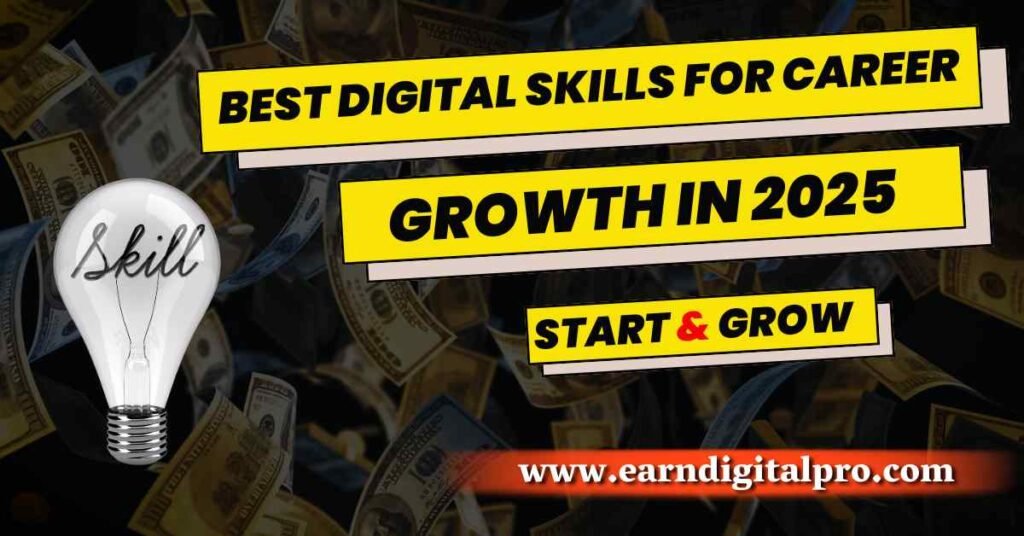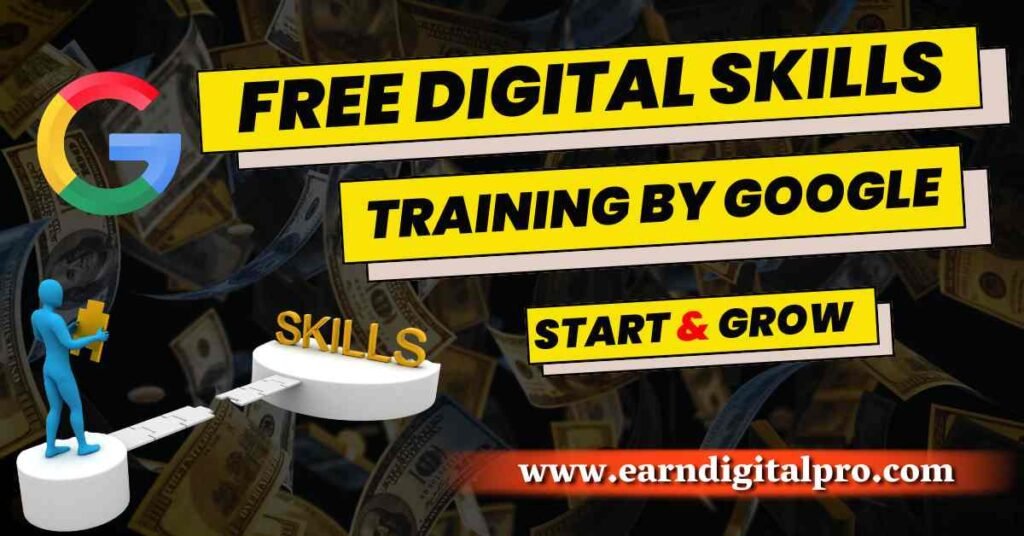The digital landscape is evolving at an unprecedented rate, making it crucial for professionals and businesses to stay ahead of the curve. By 2030, several digital skills will dominate the job market, and acquiring them can future-proof your career.
In this detailed guide, we’ll explore the top digital skills expected to be in demand by 2030 and why they matter. lest go Most In-Demand Digital Skills for the Future (2030) learn.

1. Artificial Intelligence
Artificial Intelligence and Machine Learning are driving automation and innovation across industries. These technologies are transforming how businesses operate, making AI and ML some of the most sought-after skills.
Artificial Intelligence (AI) is revolutionizing industries, from healthcare to finance. AI-powered tools like ChatGPT and self-driving cars showcase its potential to automate tasks and improve efficiency.
Meet Sarah, a small business owner who integrated AI chatbots for customer support. Her response time improved by 60%, boosting customer satisfaction. According to PwC, AI could contribute $15.7 trillion to the global economy by 2030.
To leverage AI, businesses should adopt machine learning, automation, and predictive analytics. AI-driven marketing, chatbots, and recommendation engines enhance user experiences and drive sales.
2. Data Science and Big Data Analytics
With the explosion of data, the ability to analyze and interpret large datasets is essential. Data scientists help businesses make informed decisions by uncovering trends and insights.
Data Science and Big Data Analytics are transforming how businesses make decisions. By analyzing large datasets, companies can uncover patterns, predict trends, and improve efficiency.
Take Netflix, for example. The streaming giant uses Big Data Analytics to recommend content based on user behavior, increasing engagement and retention. According to Statista, the global Big Data market is expected to reach $103 billion by 2027, proving its massive potential.
To succeed in data science, businesses leverage machine learning, artificial intelligence, and predictive analytics. Industries like healthcare, finance, and e-commerce use these tools to enhance customer experiences and drive revenue.
3. Cybersecurity and Ethical Hacking
With cyber threats on the rise, cybersecurity and ethical hacking have become essential for protecting sensitive data. Businesses and individuals must safeguard their information from cybercriminals who exploit security loopholes.
Take John, an ethical hacker who helps companies identify vulnerabilities before hackers do. Using penetration testing and security audits, he prevents potential breaches. According to Cybersecurity Ventures, global cybercrime costs could reach $10.5 trillion annually by 2025.
To stay secure, businesses implement firewalls, encryption, and multi-factor authentication. Ethical hackers, also known as white-hat hackers, use their skills to strengthen security systems legally.
Learning ethical hacking tools like Kali Linux, Wireshark, and Metasploit can lead to a lucrative cybersecurity career. As cyber threats evolve, the demand for skilled cybersecurity experts continues to grow. Stay proactive, stay secure
4. Cloud Computing
Cloud computing has revolutionized how businesses store, process, and access data. Instead of relying on physical servers, companies now use cloud-based solutions like AWS, Microsoft Azure, and Google Cloud to improve efficiency and scalability.
Take Sarah, a small business owner who moved her operations to the cloud. By using cloud storage and SaaS applications, she reduced IT costs and improved team collaboration. According to Gartner, global cloud spending is expected to reach $600 billion by 2025, proving its rapid growth.
Cloud computing offers benefits like on-demand access, cost-effectiveness, and enhanced security. Industries from healthcare to finance leverage cloud-based AI, big data analytics, and cybersecurity solutions to stay competitive.
Businesses should choose a hybrid or multi-cloud strategy to enhance flexibility and security. As cloud technology evolves, adopting serverless computing and edge computing will further optimize digital operations
5. Digital Marketing and SEO
In today’s digital world, digital marketing and SEO (Search Engine Optimization) are essential for business growth. Companies use content marketing, social media, and PPC advertising to attract customers, while SEO ensures their websites rank higher on Google.
Take Emma, a small business owner struggling with online visibility. After optimizing her website with keywords, backlinks, and high-quality content, her organic traffic increased by 120% in three months. According to HubSpot, 75% of users never scroll past the first search results page, proving the importance of SEO.
To succeed, businesses should focus on on-page SEO, mobile-friendliness, and local SEO. Using tools like Google Analytics, Ahrefs, and SEMrush helps track performance and refine strategies.
Creating long-form, engaging content and optimizing for voice search can boost rankings. Digital marketing and SEO are ever-evolving, so staying updated with Google algorithms is crucial for success.
6. Blockchain Technology

Originally developed for cryptocurrency, blockchain is now used in finance, supply chain, healthcare, and more. Blockchain skills are growing in demand as industries adopt decentralized systems.
Blockchain technology is revolutionizing industries by offering secure, transparent, and decentralized solutions. Initially developed for Bitcoin, blockchain now powers finance, healthcare, and supply chains.
Imagine a world where financial fraud is impossible—blockchain makes this a reality. It creates an immutable ledger where transactions are verified by a network of computers, eliminating the need for intermediaries. Major companies like IBM and Walmart leverage blockchain for supply chain tracking, enhancing efficiency and trust.
Also Read Learn Digital Skills Online and Earn Money
7. UI/UX Design
User experience (UX) and user interface (UI) design are critical for creating seamless, engaging digital experiences. Companies prioritize professionals who can design intuitive products.
Great UI/UX design isn’t just about looks it’s about how users feel when interacting with a product. Ever abandoned a website because it was confusing? That’s poor UX. Now, think of Apple’s intuitive design smooth, simple, and engaging.
User-centric design is key. Studies show that 88% of users won’t return after a bad experience. That’s why brands invest in UX research, wireframing, and usability testing to refine interfaces. Companies like Airbnb use data-driven design to enhance user satisfaction, boosting conversions.
From mobile apps to e-commerce sites, a seamless UI can mean the difference between success and failure. Prioritizing accessibility, fast load times, and intuitive navigation improves engagement and retention.
Is UI/UX Design Profitable?
Absolutely! UI/UX design is one of the most lucrative freelance and full-time careers today. As businesses prioritize user experience, skilled designers are in high demand. But how profitable is it? Let’s break it down. Companies know that a seamless user experience boosts conversions. That’s why businesses—from startups to Fortune 500 companies—invest heavily in UI/UX design. According to Glassdoor, UI/UX designers earn an average of $85,000 per year, while top freelancers charge $50–$150 per hour on platforms like Upwork.
Freelancers often make more than salaried designers by working with multiple clients. For example, Sarah, a self-taught UX designer, built a $120,000/year freelance business within three years. With AI-driven design tools emerging, creativity and human-centric design are more valuable than ever. As e-commerce, SaaS, and mobile apps grow, UI/UX professionals will always be needed.
UI/UX design isn’t just profitable it’s future-proof. Whether freelancing or in a full-time role, skilled designers can earn six figures with the right expertise. Ready to start? Build a strong portfolio, stay updated, and watch your income grow.
8. Internet of Things (IoT)
IoT connects everyday devices to the internet, creating smarter ecosystems. Skills in IoT development, management, and security are in high demand. The Internet of Things (IoT) is transforming everyday life, making homes, cities, and industries smarter. Imagine waking up to a coffee maker that starts brewing as soon as your alarm goes off—that’s IoT in action!
From smart thermostats like Nest to connected cars and wearable fitness trackers, IoT devices collect and share data to enhance convenience and efficiency. Businesses leverage IoT for predictive maintenance, reducing downtime and saving costs. In healthcare, IoT-powered devices like remote patient monitors improve medical outcomes.
With over 15 billion connected devices in 2024, cybersecurity is a growing concern. Experts stress the need for strong encryption and regular software updates to prevent breaches. As IoT continues to evolve, its impact on automation, sustainability, and daily convenience will only expand. Whether at home or in business, embracing IoT means stepping into a smarter, more connected future.
9. Robotics and Automation
Automation and robotics are revolutionizing industries, from manufacturing to healthcare. Skills in robotics engineering and programming are essential for future workplaces.
Robotics and automation are revolutionizing industries, from manufacturing to healthcare. Imagine robots assembling cars with precision or AI-driven chatbots handling customer support—this isn’t the future, it’s happening now!
Companies like Tesla use robotic arms for efficient car production, reducing human error and boosting output. In healthcare, robotic-assisted surgery improves accuracy, leading to better patient outcomes. Even retail giants like Amazon rely on automation for faster order fulfillment.
With global automation spending expected to reach $265 billion by 2025, businesses are rapidly adopting these technologies to enhance efficiency. However, concerns about job displacement exist. Experts suggest that while automation may replace some jobs, it will also create new roles in AI management and robotics engineering.
As industries evolve, embracing robotics ensures competitiveness and innovation. Whether you’re an entrepreneur or a tech enthusiast, staying ahead in the automation era is key.
Imagine a world where robots handle tedious tasks, freeing humans for creativity and problem-solving. That world is already here. Robotics and automation are reshaping industries, improving efficiency, safety, and precision.
From manufacturing to healthcare, robots are taking on roles that were once labor-intensive. In factories, robotic arms assemble cars with pinpoint accuracy, reducing errors and production costs. In medicine, robotic-assisted surgery enables doctors to perform complex procedures with minimal invasiveness, leading to faster patient recovery.
Why Robotics Skills Matter
Robotics skills are becoming essential as automation transforms industries. From self-driving cars to robotic surgery, technology is reshaping how we live and work. But why should you care.
Jobs in robotics and artificial intelligence (AI) are booming. According to the World Economic Forum, automation will create 97 million new jobs by 2025. Engineers, programmers, and technicians with robotics expertise will be in high demand.
Even outside tech fields, understanding robotics is valuable. Manufacturing, healthcare, and even agriculture are integrating automation. For example, robotic exoskeletons assist factory workers in reducing physical strain, improving efficiency.
Learning robotics enhances problem-solving, creativity, and critical thinking—skills essential in any career. Schools and universities now offer courses in robotics programming, ensuring students stay competitive.
10. Software Development and Programming
Software development and programming are the backbone of modern technology. From mobile apps to AI-powered tools, developers create solutions that drive innovation.
Think about your favorite app—whether it’s Instagram or Netflix—it was built by skilled programmers using languages like Python, Java, or JavaScript. Businesses rely on software to streamline operations, automate tasks, and enhance customer experiences.
With global software development spending projected to reach $1 trillion by 2026, demand for developers is skyrocketing. Companies seek experts in web development, cybersecurity, and cloud computing to stay competitive. Even beginners can start coding with platforms like Codecademy and freeCodeCamp.
Beyond technical skills, problem-solving and creativity make great developers. Whether you’re building a startup or enhancing digital security, programming is a future-proof career.
Also Read –
Conclusion : Most In-Demand Digital Skills for the Future? (2030)
The digital future belongs to those who adapt to the latest trends and continuously upskill themselves. Whether it’s AI, cybersecurity, or digital marketing, these skills will keep you relevant in the evolving job market.

Ashraf Kamal is an experienced digital marketer and content creator who shares authentic methods of blogging, SEO, freelancing, and online earning. Earn Digital Pro aims to provide readers with valuable and practical knowledge to help them succeed in their online journey.

